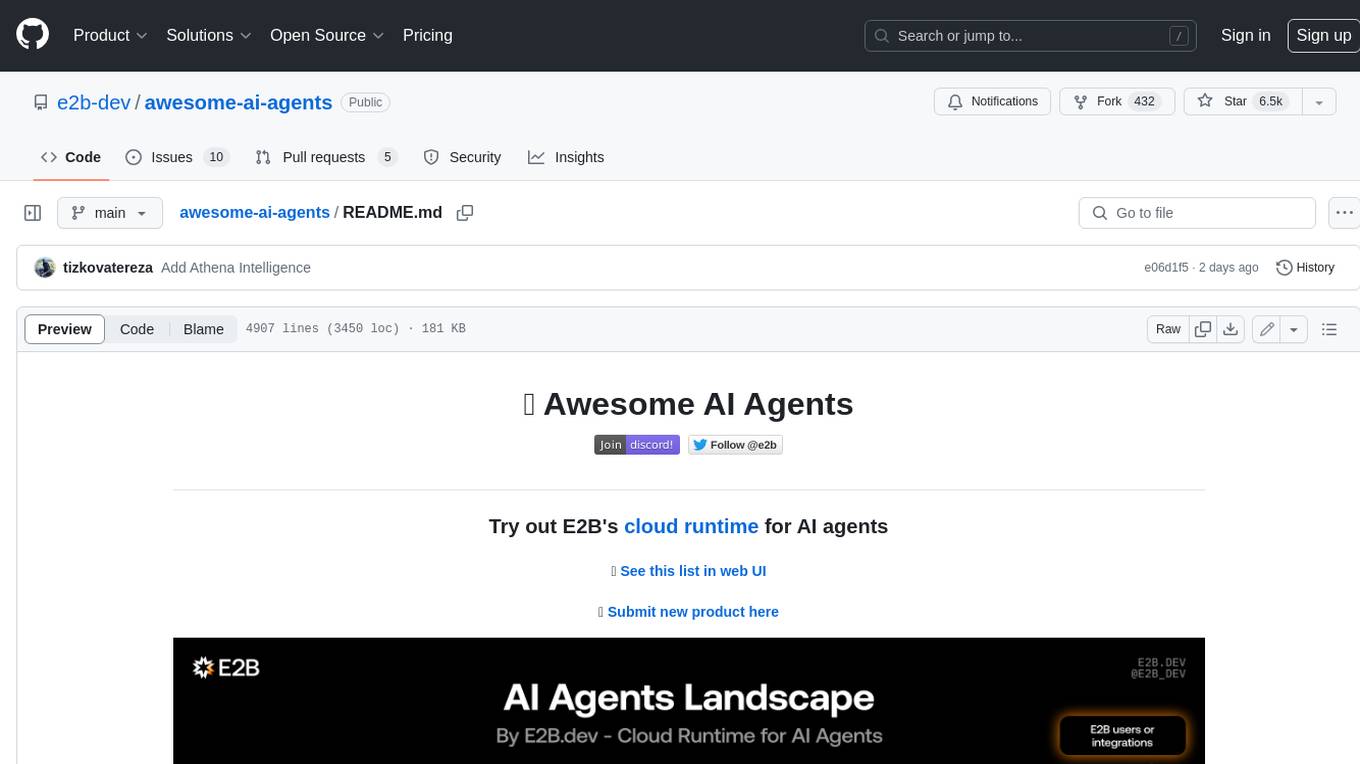
GenshinGamePlay
参考Genshin的GamePlay框架,包括战斗、解谜、怪物AI、剧情,持续开发中
Stars: 305
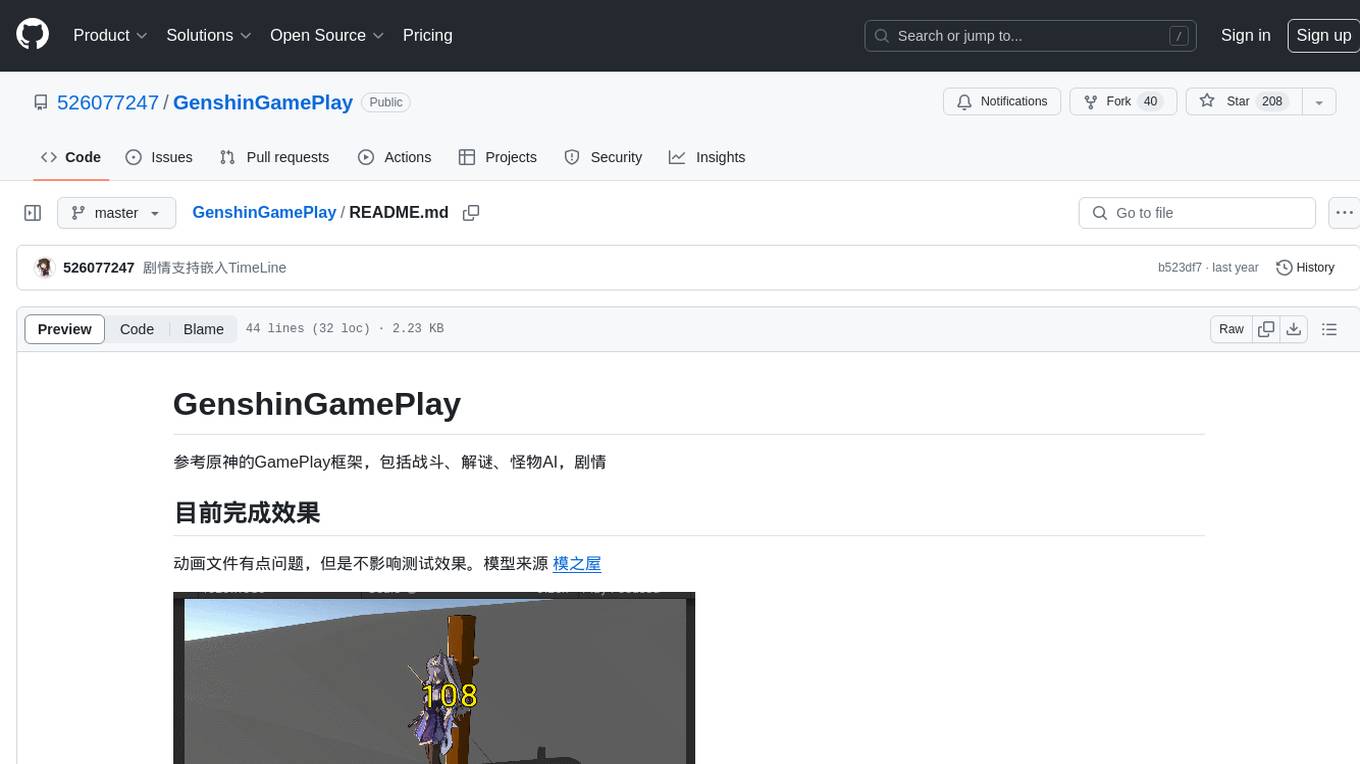
GenshinGamePlay is a repository that references the gameplay framework of Genshin Impact, including combat, puzzle solving, monster AI, and storyline. It currently showcases animations for combat skills, treasure hunting puzzles, and monster AI. The repository also includes a table export tool and references various Unity frameworks and plugins for game development. The repository aims to provide resources and tools for developing gameplay mechanics similar to Genshin Impact.
README:
参考原神的GamePlay框架,包括战斗、解谜、怪物AI、剧情等
使用Json序列化的Graph编辑器、二进制Json序列化的配置
动画文件有点问题,但是不影响测试效果。模型来源 模之屋
打开 /Tools/ExcelExport/ExcelExport.sln 编译后可用
- WorldReverse
- TaoTie 轻量级Unity框架
- YooAsset Unity3D的资源管理系统
- Nino 实用的高性能C#序列化模块
- FernNPR NPR渲染库
- DaGenGraph 节点编辑器
- ET 单线程异步、协程锁、计时器、数值组件、导表工具、打包工具
- UnityScriptHotReload 运行中无感重载C#代码
- Odin Inspector 编辑器扩展
- SuperScrollView UI滑动列表扩展
- Dynamic Bone 动态骨骼
For Tasks:
Click tags to check more tools for each tasksFor Jobs:
Alternative AI tools for GenshinGamePlay
Similar Open Source Tools

GenshinGamePlay
GenshinGamePlay is a repository that references the gameplay framework of Genshin Impact, including combat, puzzle solving, monster AI, and storyline. It currently showcases animations for combat skills, treasure hunting puzzles, and monster AI. The repository also includes a table export tool and references various Unity frameworks and plugins for game development. The repository aims to provide resources and tools for developing gameplay mechanics similar to Genshin Impact.
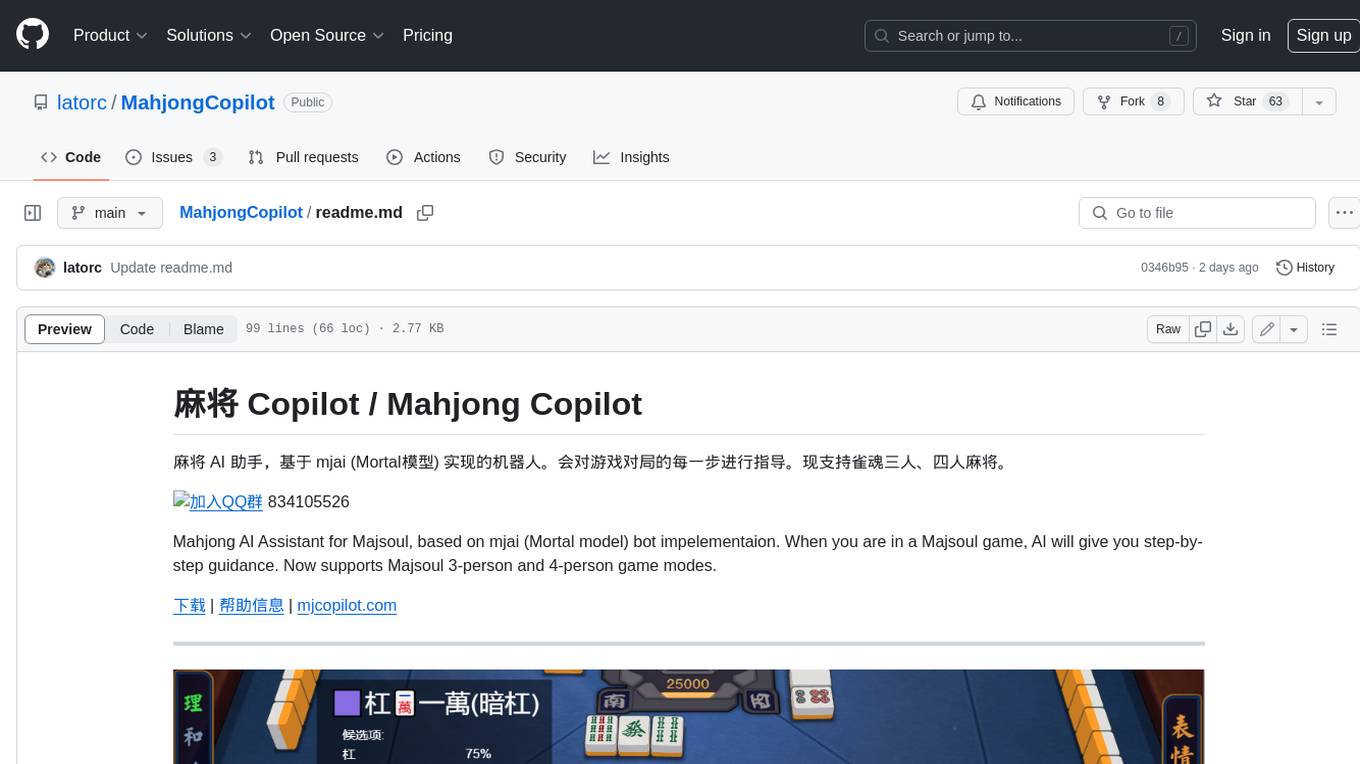
MahjongCopilot
Mahjong Copilot is an AI assistant for the game Mahjong, based on the mjai (Mortal model) bot implementation. It provides step-by-step guidance for each move in the game, and can also be used to automatically play and join games. Mahjong Copilot supports both 3-person and 4-person Mahjong games, and is available in multiple languages.
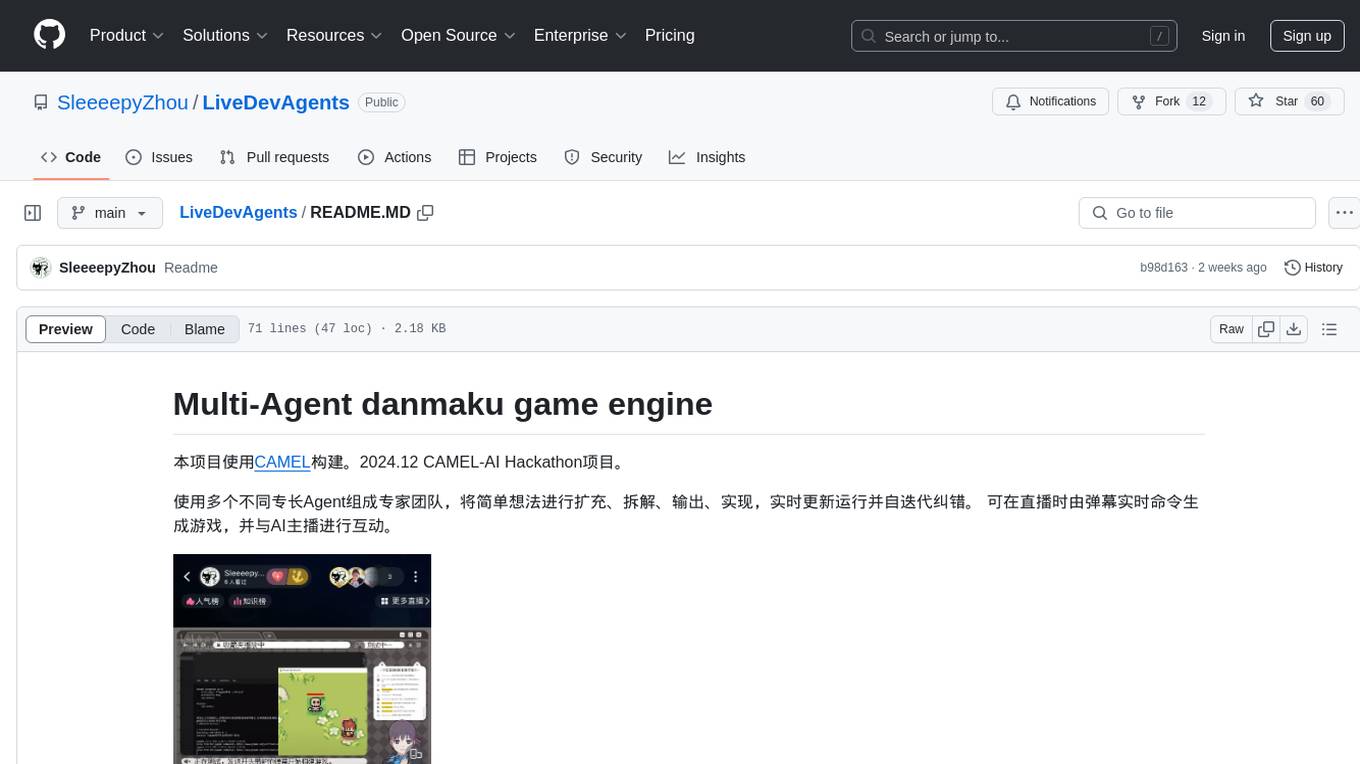
LiveDevAgents
LiveDevAgents is a multi-agent danmaku game engine built using CAMEL. It was developed for the 2024.12 CAMEL-AI Hackathon project. The engine allows for the creation of games in real-time through live bullet comments during streaming, enabling interaction with AI hosts. The project aims to expand and deconstruct simple ideas with a team of agents of different expertise, continuously updating and self-correcting during runtime. It also supports workforce enhancement, migration of anchor agents to a new framework, improvement of bullet comment processing logic, expansion of live control for more platforms, integration of art and music agents, and VR shared workspace for collaborative development.
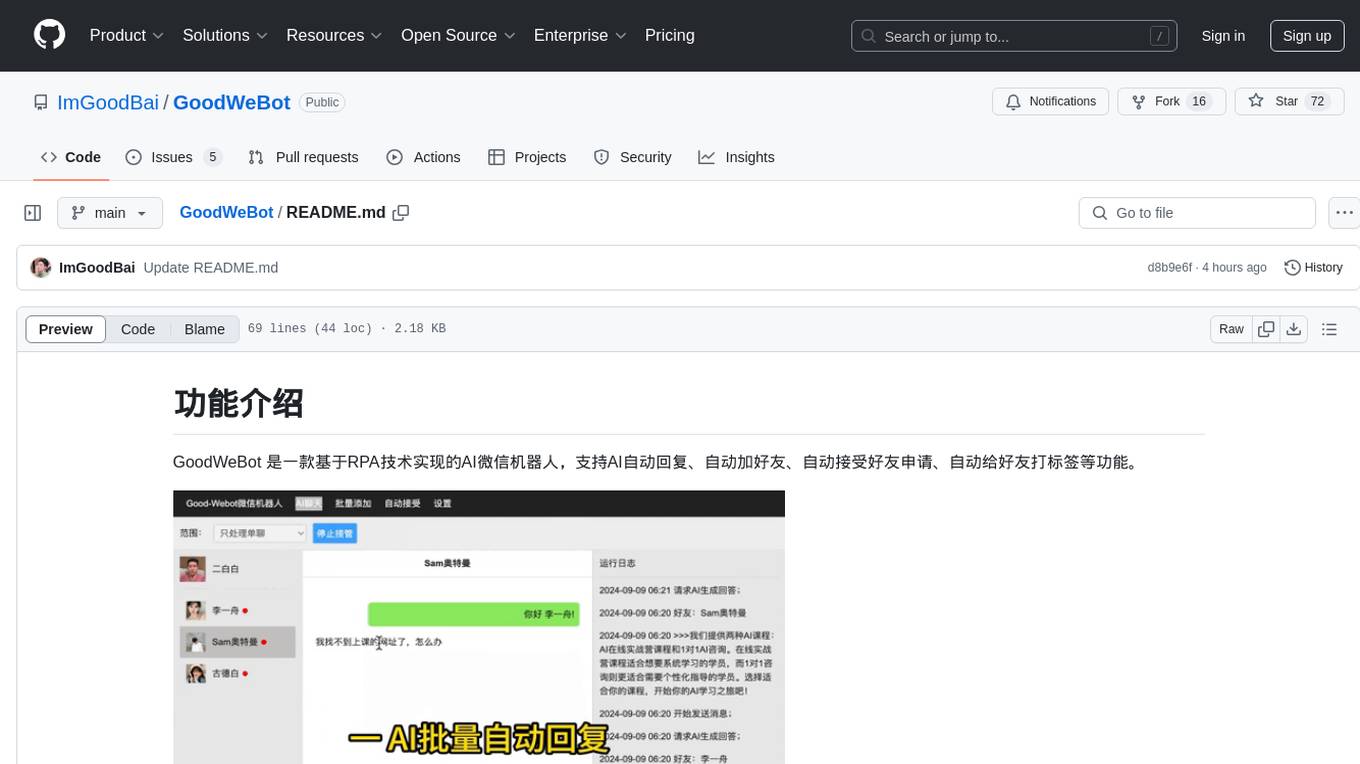
GoodWeBot
GoodWeBot is an AI WeChat robot based on RPA technology, supporting AI automatic replies, automatic friend adding, automatic friend request acceptance, automatic friend tagging, and more. It is fully compliant with RPA technology, easy to use with one-click download and run without installation, and integrates with mainstream AI services like coze. The tool is free to use and provides features like AI chat support, contact synchronization, group messaging, and coze API testing. Users should comply with GPL 3.0 open-source license and use the tool for technical research and learning purposes only, following local laws and regulations. The tool should not be used for any illegal or infringing activities, and users are responsible for the consequences of their usage.
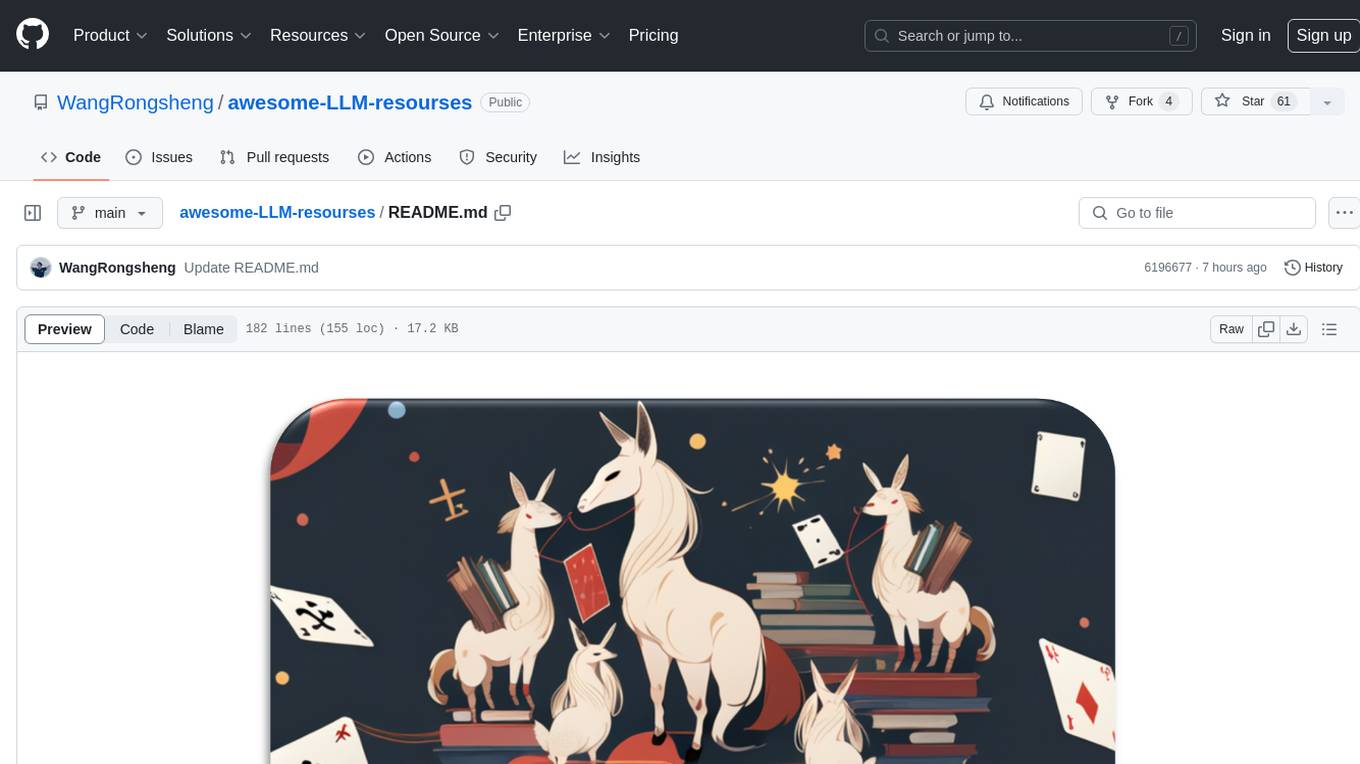
awesome-LLM-resourses
A comprehensive repository of resources for Chinese large language models (LLMs), including data processing tools, fine-tuning frameworks, inference libraries, evaluation platforms, RAG engines, agent frameworks, books, courses, tutorials, and tips. The repository covers a wide range of tools and resources for working with LLMs, from data labeling and processing to model fine-tuning, inference, evaluation, and application development. It also includes resources for learning about LLMs through books, courses, and tutorials, as well as insights and strategies from building with LLMs.
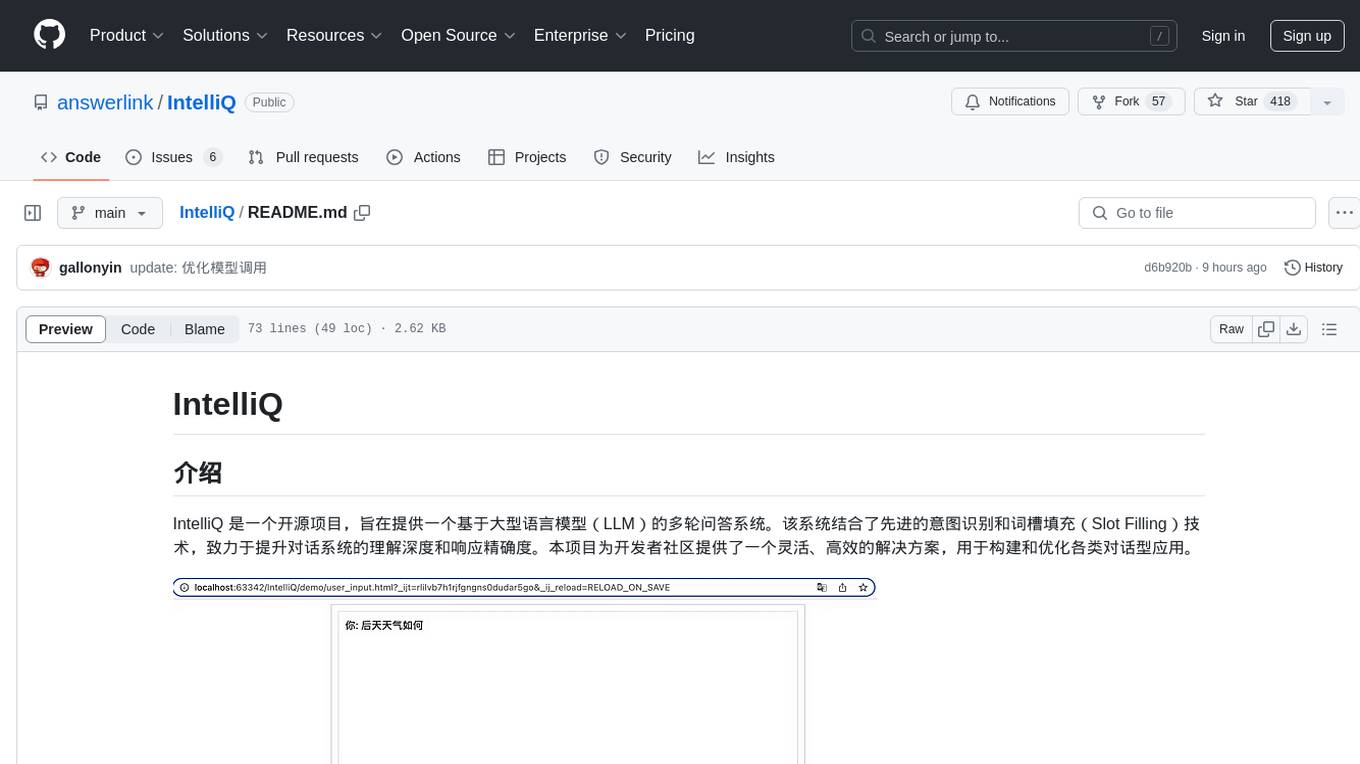
IntelliQ
IntelliQ is an open-source project aimed at providing a multi-turn question-answering system based on a large language model (LLM). The system combines advanced intent recognition and slot filling technology to enhance the depth of understanding and accuracy of responses in conversation systems. It offers a flexible and efficient solution for developers to build and optimize various conversational applications. The system features multi-turn dialogue management, intent recognition, slot filling, interface slot technology for real-time data retrieval and processing, adaptive learning for improving response accuracy and speed, and easy integration with detailed API documentation supporting multiple programming languages and platforms.
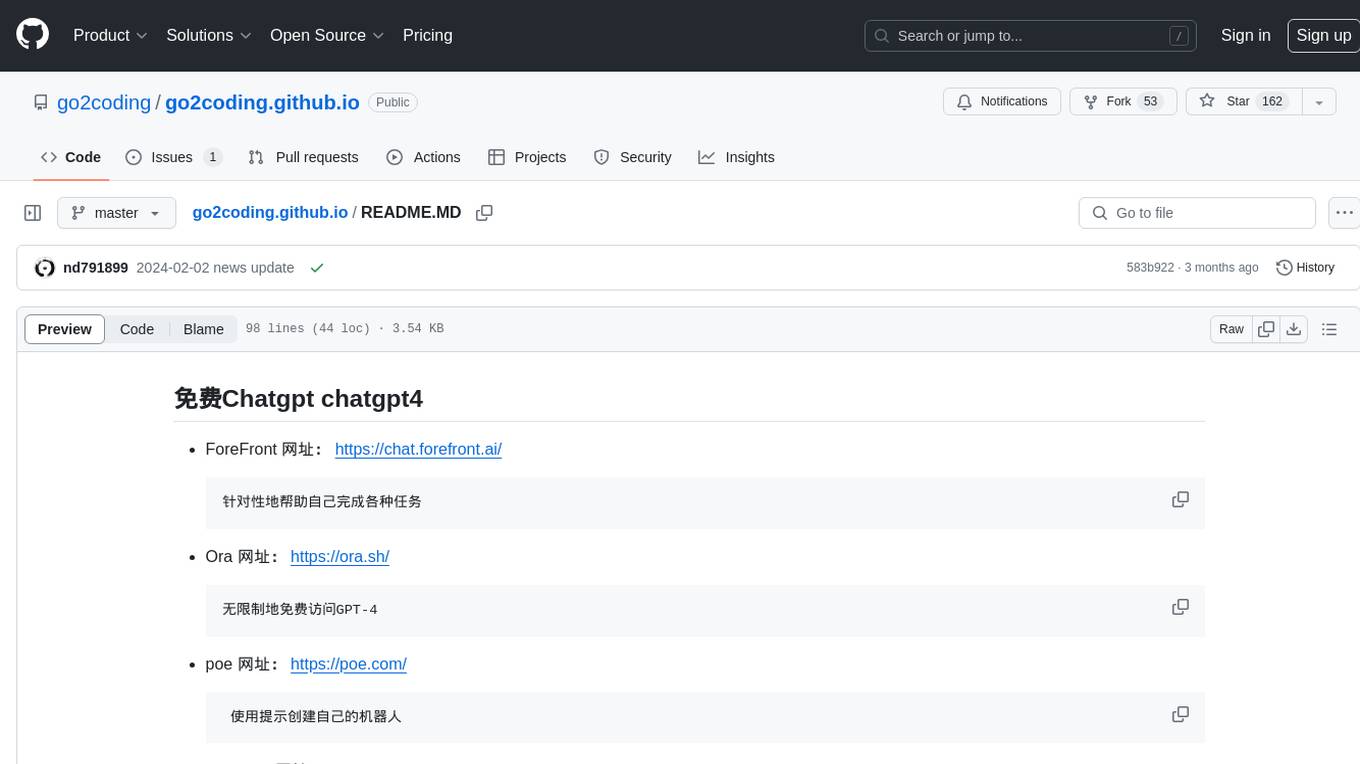
go2coding.github.io
The go2coding.github.io repository is a collection of resources for AI enthusiasts, providing information on AI products, open-source projects, AI learning websites, and AI learning frameworks. It aims to help users stay updated on industry trends, learn from community projects, access learning resources, and understand and choose AI frameworks. The repository also includes instructions for local and external deployment of the project as a static website, with details on domain registration, hosting services, uploading static web pages, configuring domain resolution, and a visual guide to the AI tool navigation website. Additionally, it offers a platform for AI knowledge exchange through a QQ group and promotes AI tools through a WeChat public account.
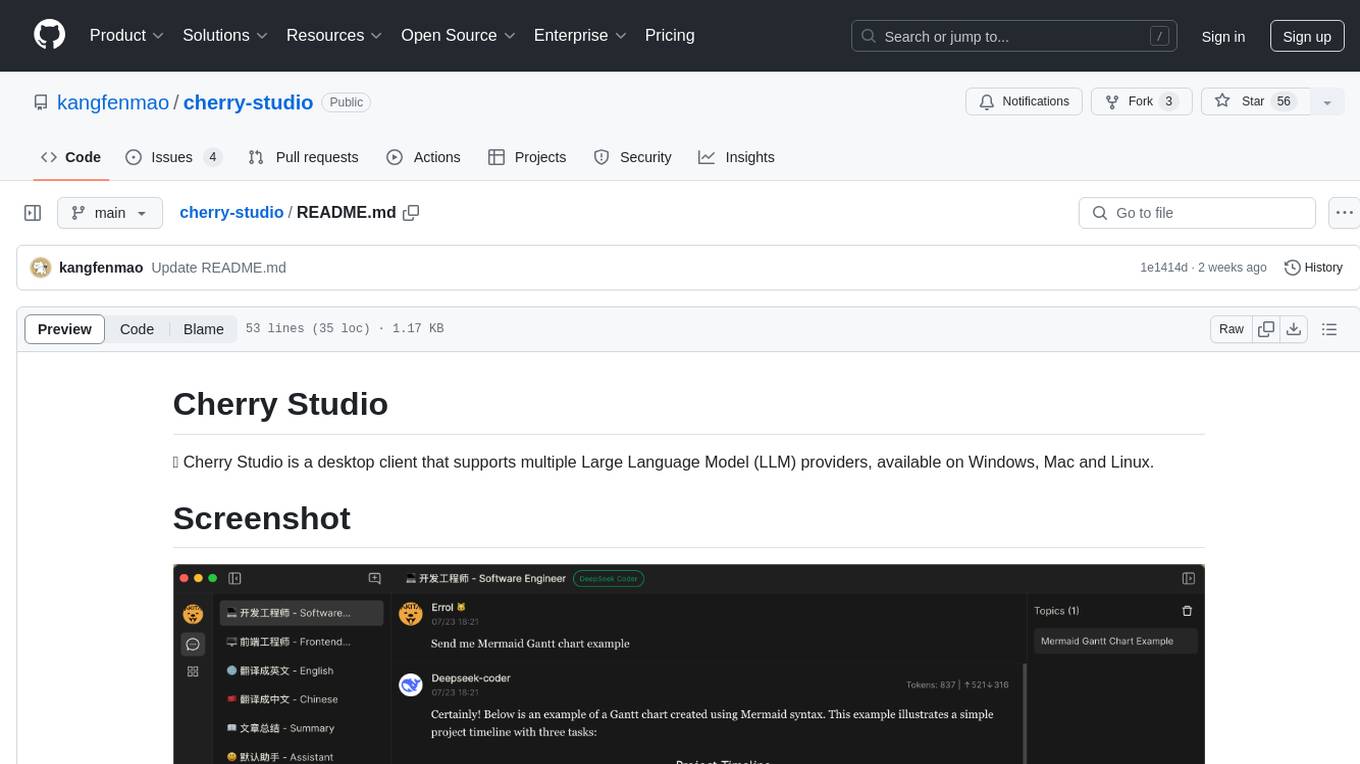
cherry-studio
Cherry Studio is a desktop client that supports multiple Large Language Model (LLM) providers, available on Windows, Mac, and Linux. It allows users to create multiple Assistants and topics, use multiple models to answer questions in the same conversation, and supports drag-and-drop sorting, code highlighting, and Mermaid chart. The tool is designed to enhance productivity and streamline the process of interacting with various language models.
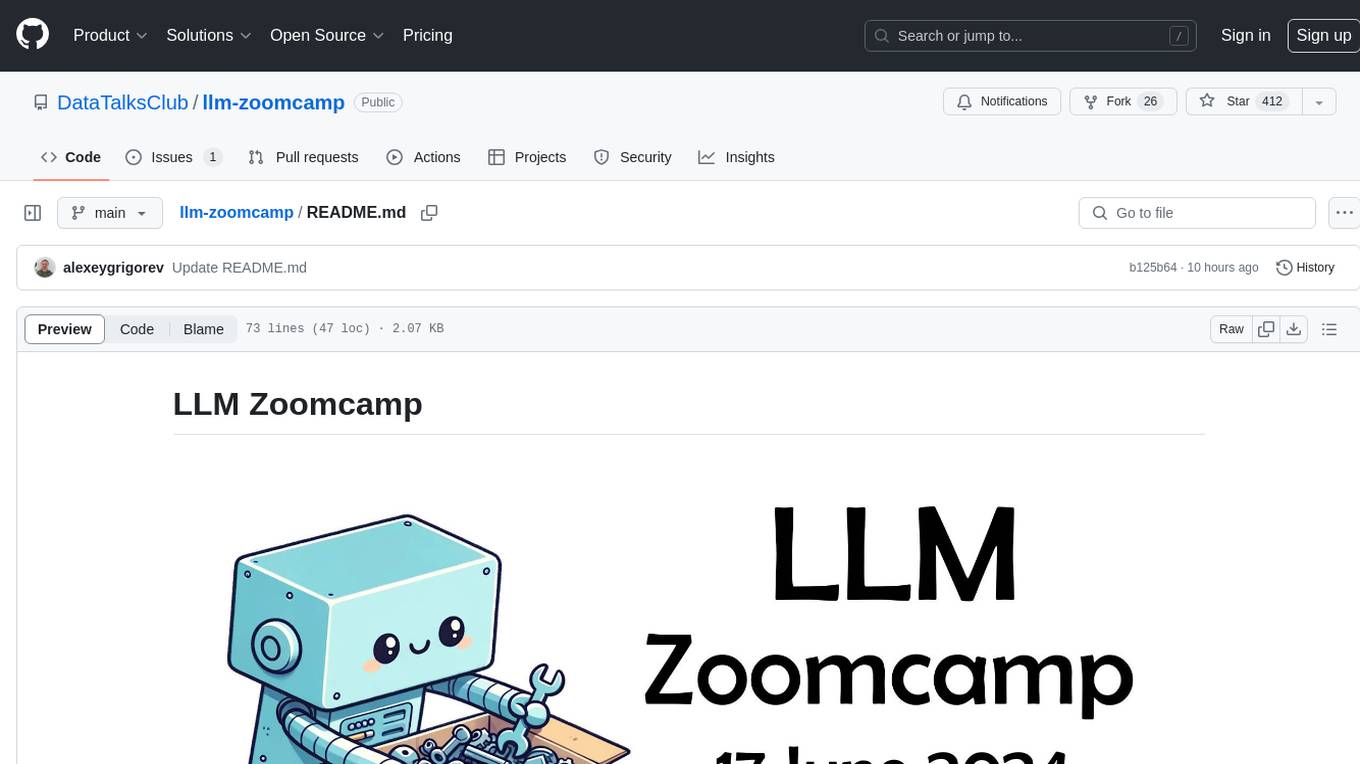
llm-zoomcamp
LLM Zoomcamp is a free online course focusing on real-life applications of Large Language Models (LLMs). Over 10 weeks, participants will learn to build an AI bot capable of answering questions based on a knowledge base. The course covers topics such as LLMs, RAG, open-source LLMs, vector databases, orchestration, monitoring, and advanced RAG systems. Pre-requisites include comfort with programming, Python, and the command line, with no prior exposure to AI or ML required. The course features a pre-course workshop and is led by instructors Alexey Grigorev and Magdalena Kuhn, with support from sponsors and partners.
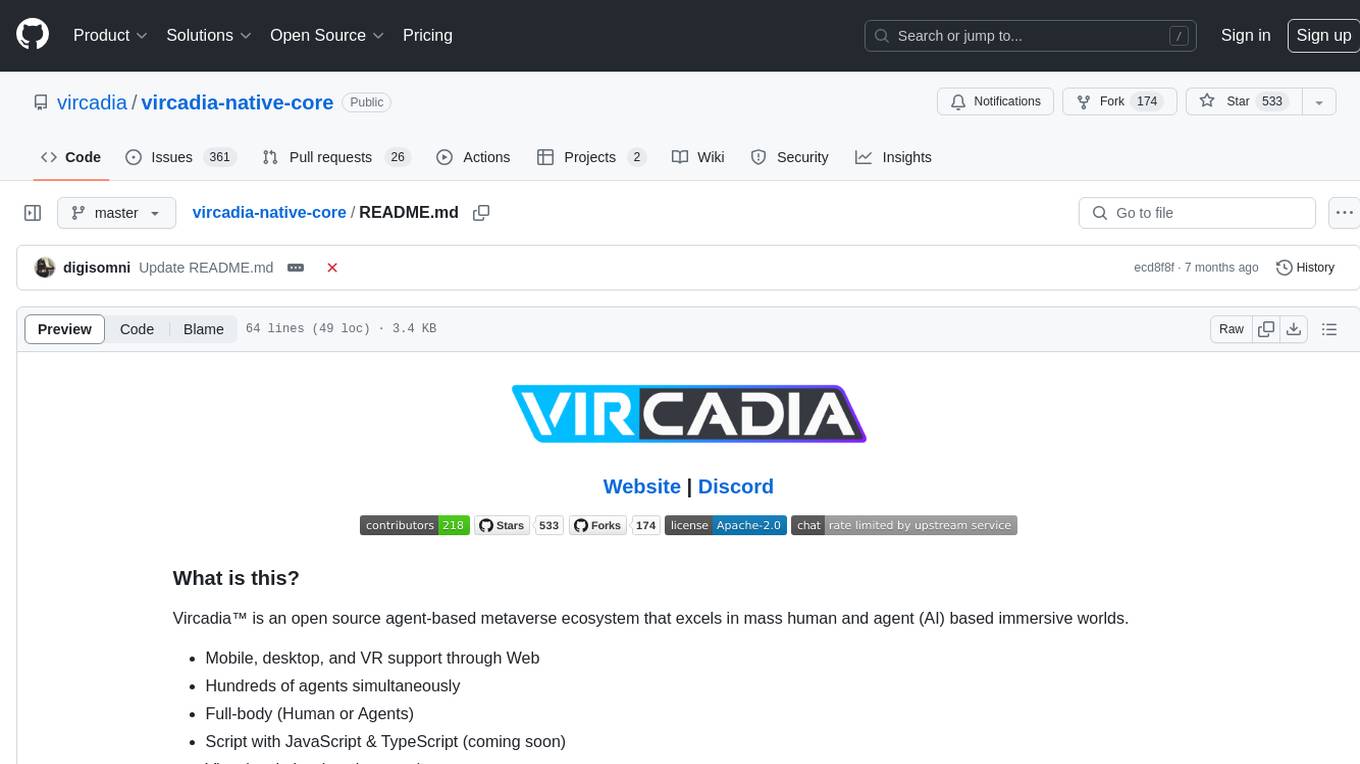
vircadia-native-core
Vircadia™ is an open source agent-based metaverse ecosystem that excels in mass human and agent (AI) based immersive worlds. It offers mobile, desktop, and VR support through the web, allows hundreds of agents simultaneously, supports full-body (human or agents), scripting with JavaScript & TypeScript, visual scripting, full world editor, 4096km³ world space in a server, fully self-hosted, and more. Vircadia is sponsored by various companies, organizations, and governments. An 'agent' in Vircadia is an AI being that shares the same space as users, interacting, speaking, and experiencing the world, used for companionship, training, and gameplay opportunities. Vircadia excels at deploying agents en-masse for a full sandbox experience.
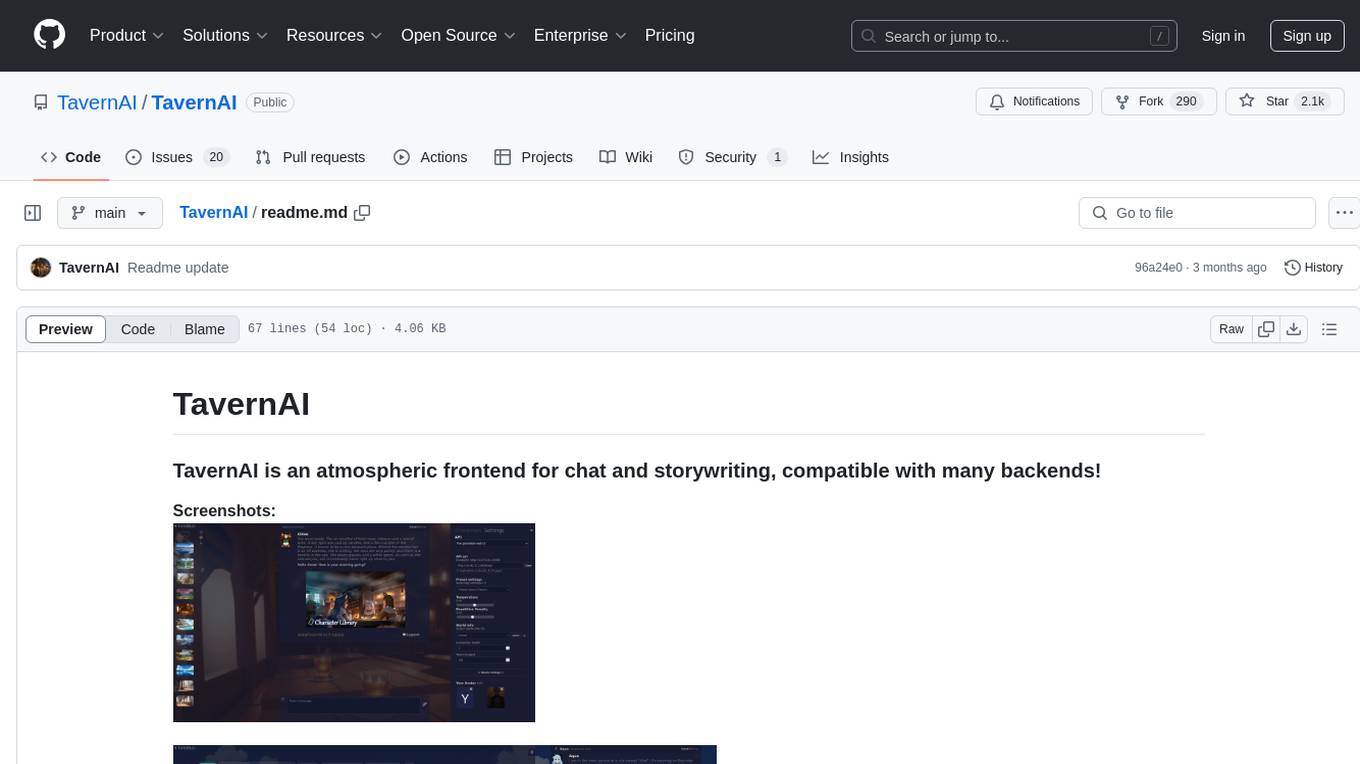
TavernAI
TavernAI is an atmospheric frontend tool for chat and storywriting, compatible with various backends. It offers features like character creation, online character database, group chat, story mode, world info, message swiping, configurable settings, interface themes, backgrounds, message editing, GPT-4.5, and Claude picture recognition. The tool supports backends like Kobold series, Oobabooga's Text Generation Web UI, OpenAI, NovelAI, and Claude. Users can easily install TavernAI on different operating systems and start using it for interactive storytelling and chat experiences.
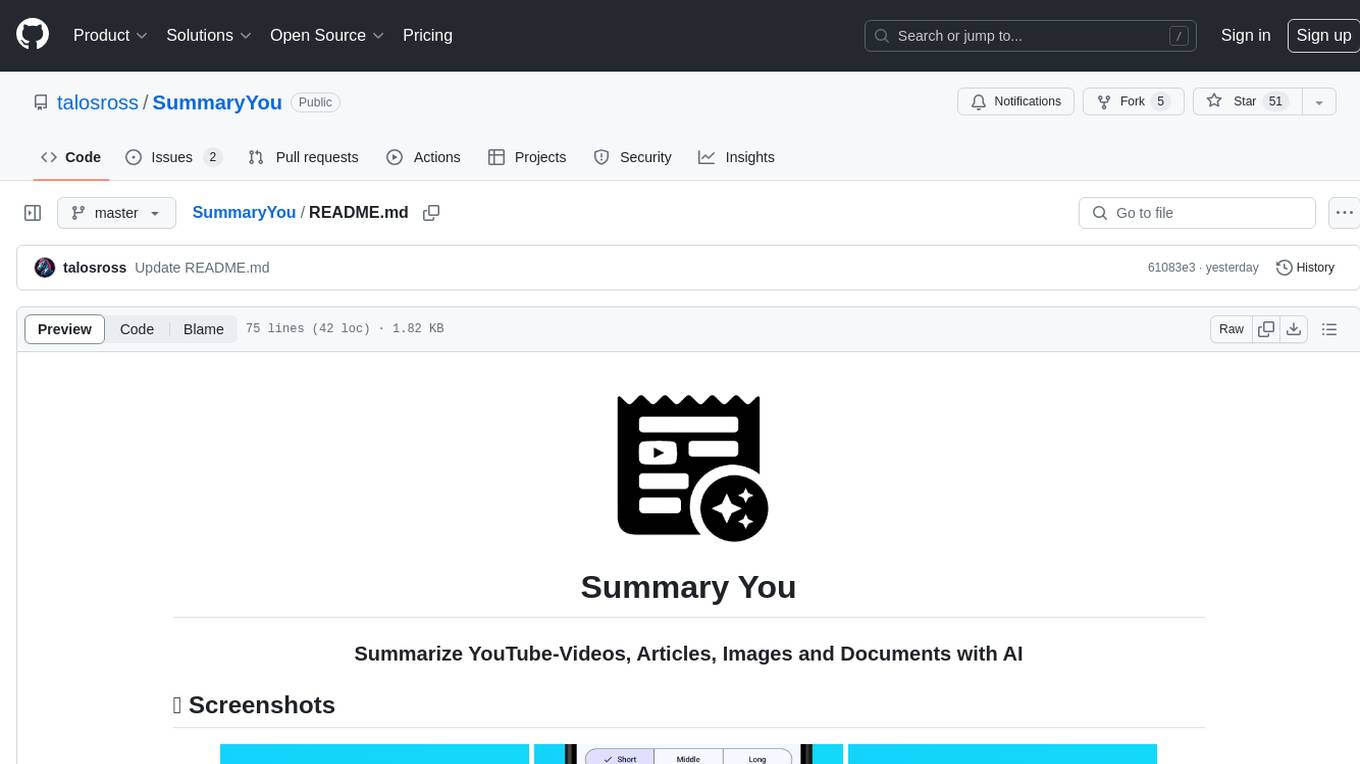
SummaryYou
Summary You is a tool that utilizes AI to summarize YouTube videos, articles, images, and documents. Users can set the length of the summary and have the option to listen to the summaries. The tool also includes a history section, intelligent paywall detection, OLED-Dark Mode, and a user-friendly Material Design 3 style UI with dynamic color themes. It uses GPT-3.5 OpenAI/Mixtral 8x7B Groq for summarization. The backend is implemented in Python with Chaquopy, and some UI designs and codes are borrowed from Seal Material color utilities.
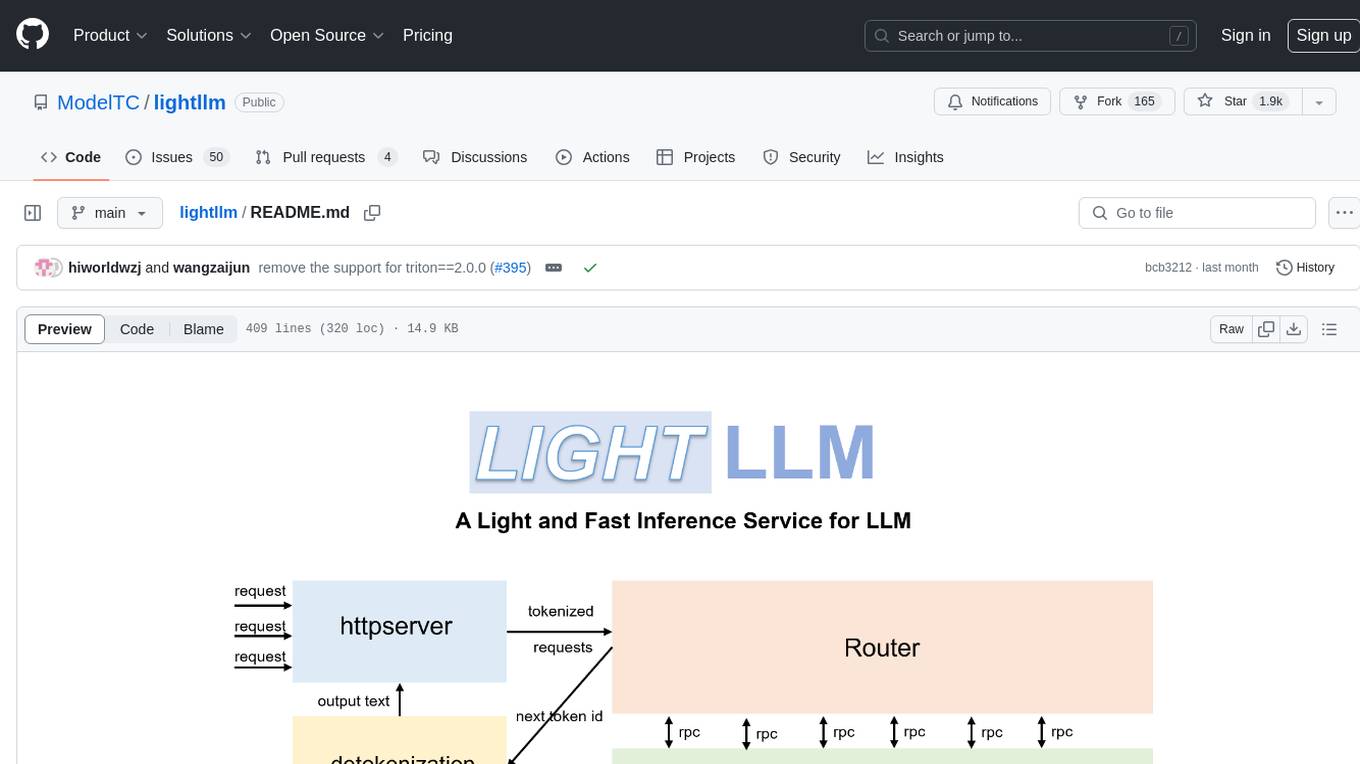
lightllm
LightLLM is a Python-based LLM (Large Language Model) inference and serving framework known for its lightweight design, scalability, and high-speed performance. It offers features like tri-process asynchronous collaboration, Nopad for efficient attention operations, dynamic batch scheduling, FlashAttention integration, tensor parallelism, Token Attention for zero memory waste, and Int8KV Cache. The tool supports various models like BLOOM, LLaMA, StarCoder, Qwen-7b, ChatGLM2-6b, Baichuan-7b, Baichuan2-7b, Baichuan2-13b, InternLM-7b, Yi-34b, Qwen-VL, Llava-7b, Mixtral, Stablelm, and MiniCPM. Users can deploy and query models using the provided server launch commands and interact with multimodal models like QWen-VL and Llava using specific queries and images.

qrbtf
QRBTF is the world's first and best AI & parametric QR code generator developed by Latent Cat. It features original AI models trained on a large number of images for fast and high-quality inference. The parametric part is open source, offering various styles without requiring a backend. Users can create beautiful QR codes by entering a URL or text, selecting a style, adjusting parameters, and downloading in SVG or JPG format. The website supports English and Chinese, with contributions for i18n in other languages welcome. QRBTF also provides a React component for integration into projects.
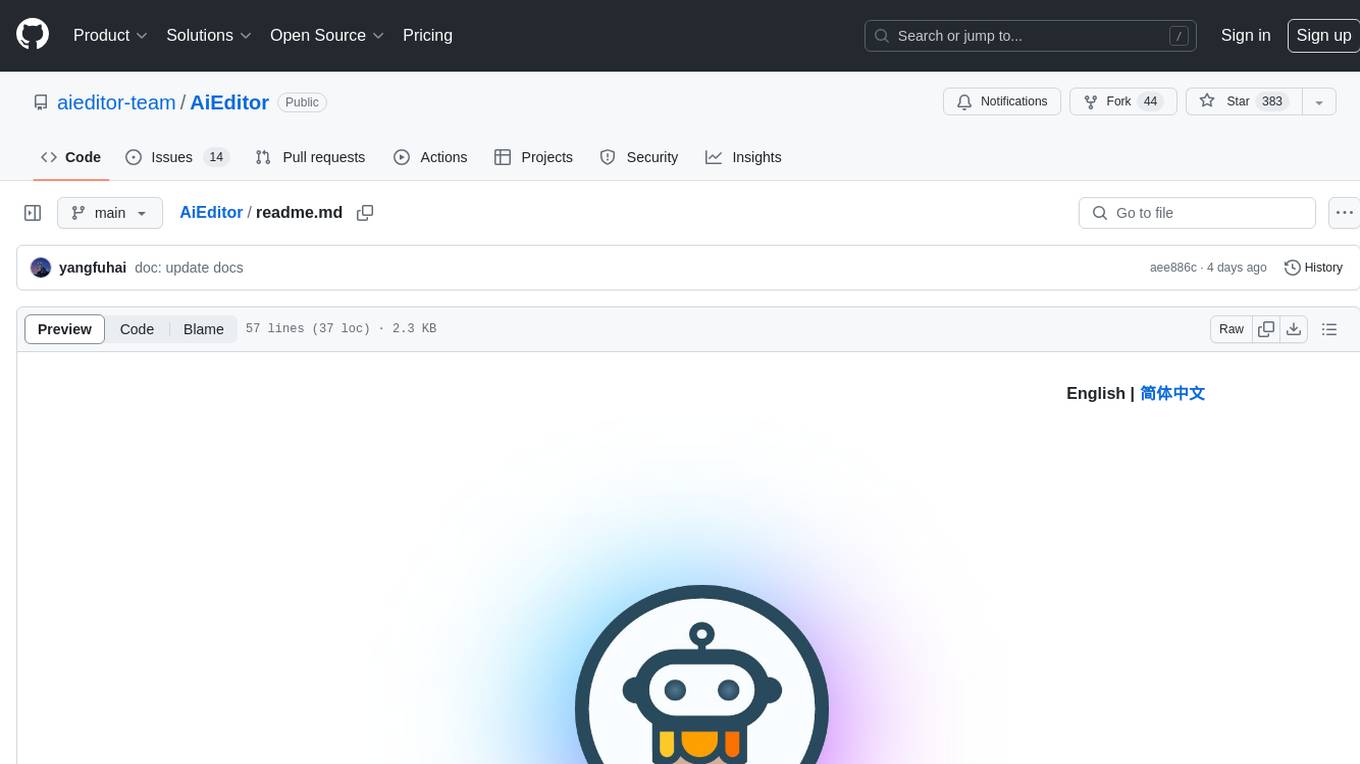
AiEditor
AiEditor is a next-generation rich text editor for AI, based on Web Component and supporting various front-end frameworks. It offers two themes, light and dark, along with flexible configuration for developing text editing applications. The editor includes features for basic text formatting, enhancements like undo/redo and format painter, support for attachments like images and videos, code-related functionalities, table manipulation, Markdown support, AI-related features such as continuation and optimization, and more. Planned improvements include collaboration, automated testing, AI picture insertion and drawing, enhanced paste features, WORD and PDF export, Notion-like operations, and integration with ChatGPT.
For similar tasks

GenshinGamePlay
GenshinGamePlay is a repository that references the gameplay framework of Genshin Impact, including combat, puzzle solving, monster AI, and storyline. It currently showcases animations for combat skills, treasure hunting puzzles, and monster AI. The repository also includes a table export tool and references various Unity frameworks and plugins for game development. The repository aims to provide resources and tools for developing gameplay mechanics similar to Genshin Impact.
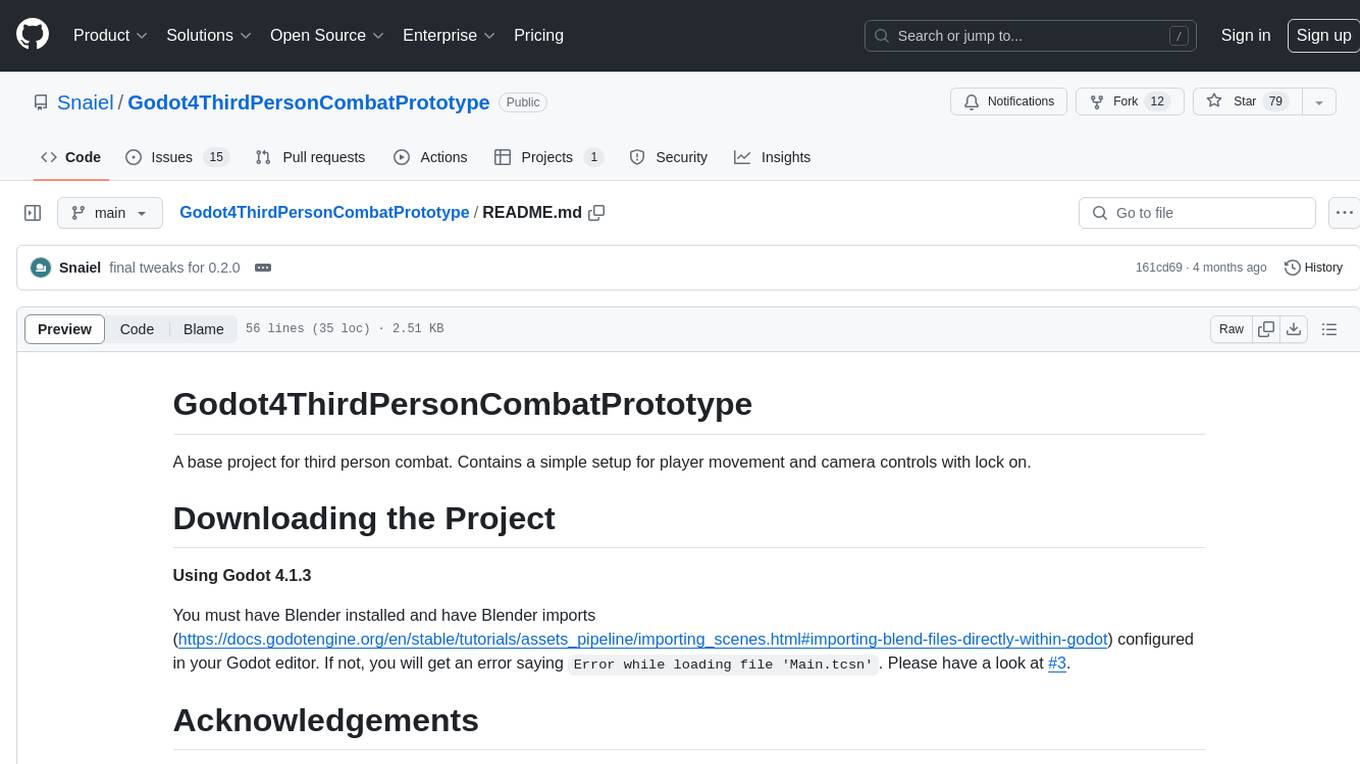
Godot4ThirdPersonCombatPrototype
Godot4ThirdPersonCombatPrototype is a base project for third person combat, featuring player movement and camera controls with lock-on functionality. It includes setups for models, animations, AI behavior, state machines, audio, and custom resources. The project aims to provide a foundation for developers to create third-person combat mechanics in their games.
For similar jobs

sweep
Sweep is an AI junior developer that turns bugs and feature requests into code changes. It automatically handles developer experience improvements like adding type hints and improving test coverage.

teams-ai
The Teams AI Library is a software development kit (SDK) that helps developers create bots that can interact with Teams and Microsoft 365 applications. It is built on top of the Bot Framework SDK and simplifies the process of developing bots that interact with Teams' artificial intelligence capabilities. The SDK is available for JavaScript/TypeScript, .NET, and Python.

ai-guide
This guide is dedicated to Large Language Models (LLMs) that you can run on your home computer. It assumes your PC is a lower-end, non-gaming setup.

classifai
Supercharge WordPress Content Workflows and Engagement with Artificial Intelligence. Tap into leading cloud-based services like OpenAI, Microsoft Azure AI, Google Gemini and IBM Watson to augment your WordPress-powered websites. Publish content faster while improving SEO performance and increasing audience engagement. ClassifAI integrates Artificial Intelligence and Machine Learning technologies to lighten your workload and eliminate tedious tasks, giving you more time to create original content that matters.

chatbot-ui
Chatbot UI is an open-source AI chat app that allows users to create and deploy their own AI chatbots. It is easy to use and can be customized to fit any need. Chatbot UI is perfect for businesses, developers, and anyone who wants to create a chatbot.

BricksLLM
BricksLLM is a cloud native AI gateway written in Go. Currently, it provides native support for OpenAI, Anthropic, Azure OpenAI and vLLM. BricksLLM aims to provide enterprise level infrastructure that can power any LLM production use cases. Here are some use cases for BricksLLM: * Set LLM usage limits for users on different pricing tiers * Track LLM usage on a per user and per organization basis * Block or redact requests containing PIIs * Improve LLM reliability with failovers, retries and caching * Distribute API keys with rate limits and cost limits for internal development/production use cases * Distribute API keys with rate limits and cost limits for students

uAgents
uAgents is a Python library developed by Fetch.ai that allows for the creation of autonomous AI agents. These agents can perform various tasks on a schedule or take action on various events. uAgents are easy to create and manage, and they are connected to a fast-growing network of other uAgents. They are also secure, with cryptographically secured messages and wallets.

griptape
Griptape is a modular Python framework for building AI-powered applications that securely connect to your enterprise data and APIs. It offers developers the ability to maintain control and flexibility at every step. Griptape's core components include Structures (Agents, Pipelines, and Workflows), Tasks, Tools, Memory (Conversation Memory, Task Memory, and Meta Memory), Drivers (Prompt and Embedding Drivers, Vector Store Drivers, Image Generation Drivers, Image Query Drivers, SQL Drivers, Web Scraper Drivers, and Conversation Memory Drivers), Engines (Query Engines, Extraction Engines, Summary Engines, Image Generation Engines, and Image Query Engines), and additional components (Rulesets, Loaders, Artifacts, Chunkers, and Tokenizers). Griptape enables developers to create AI-powered applications with ease and efficiency.




